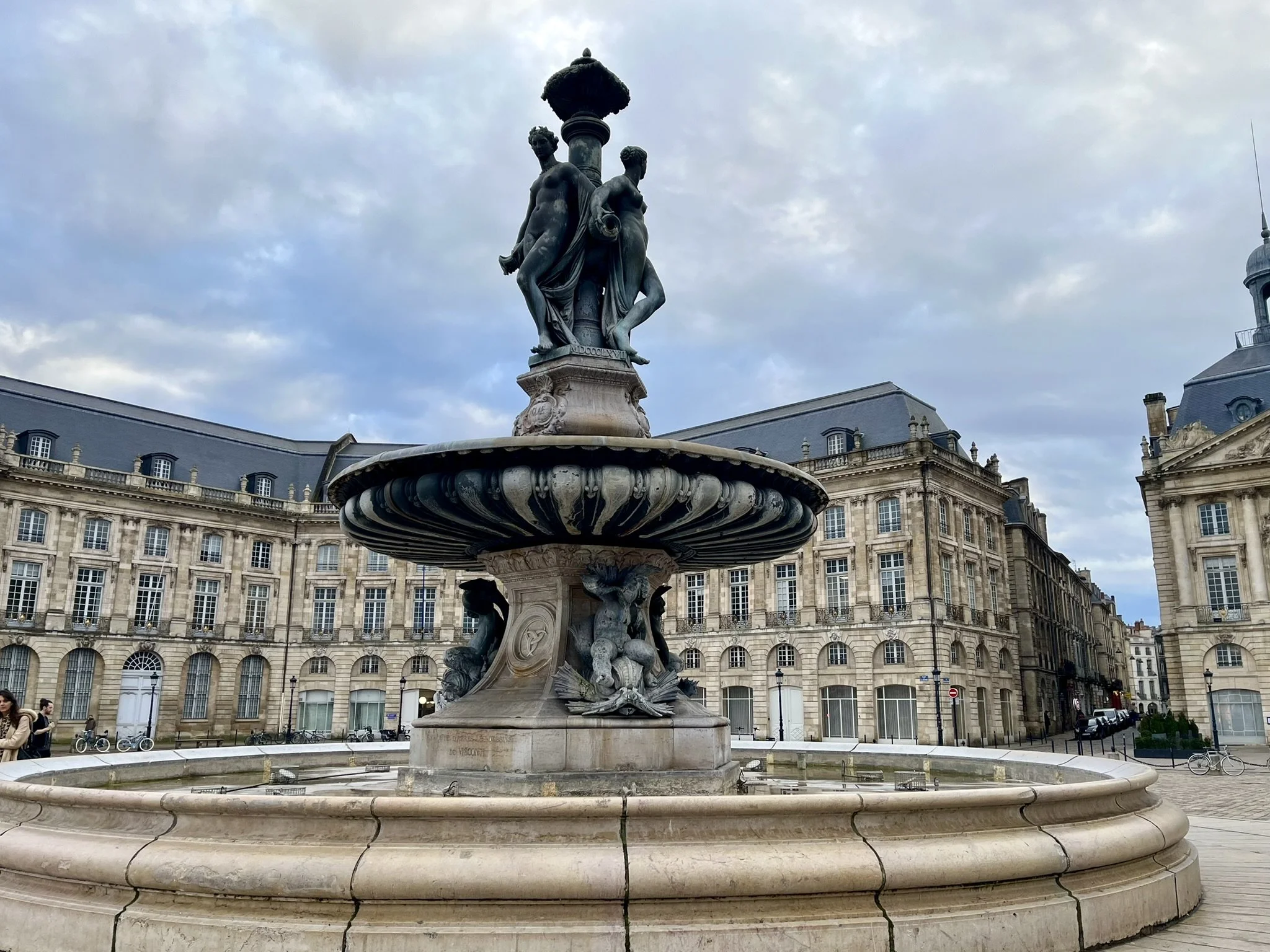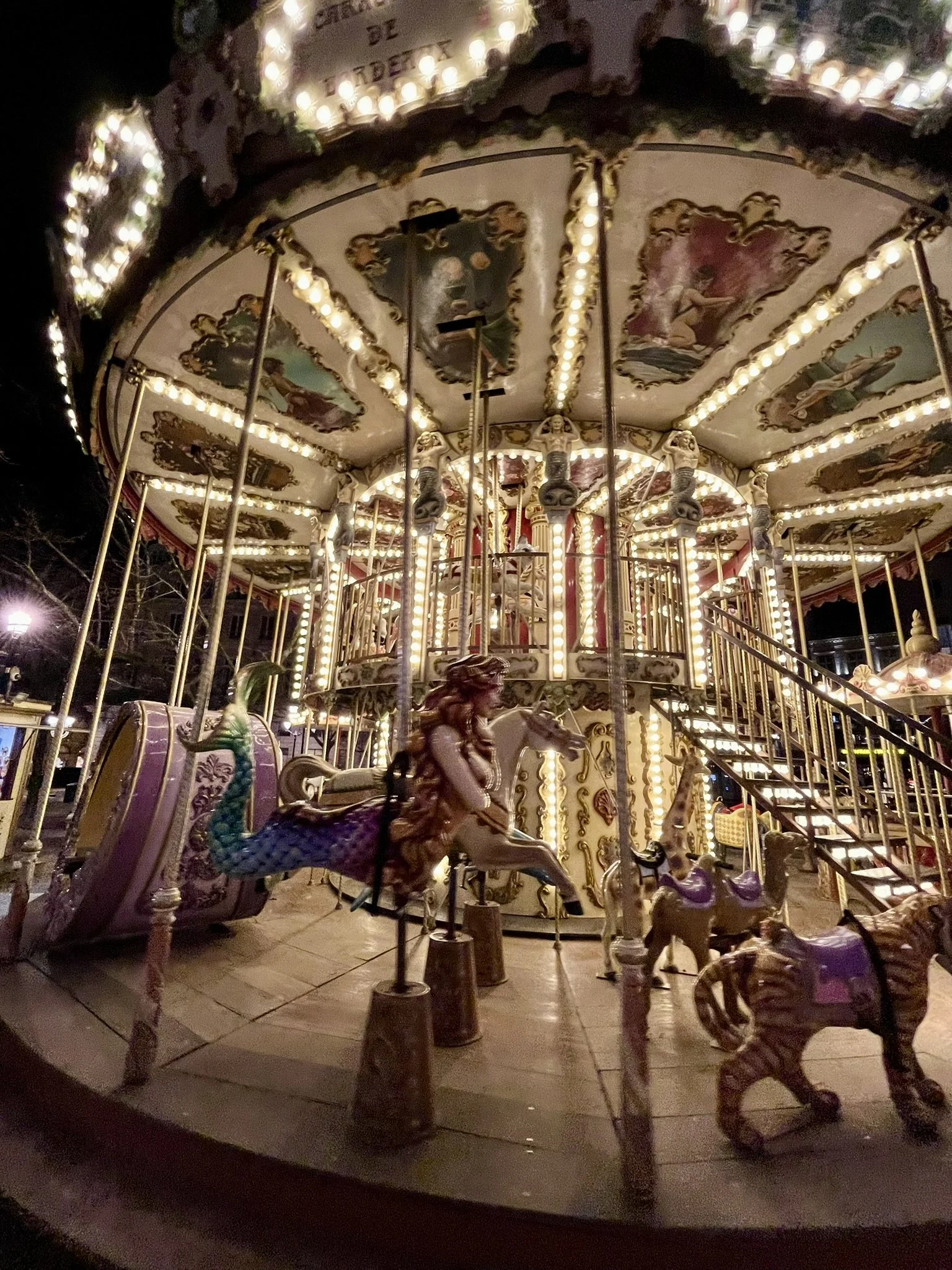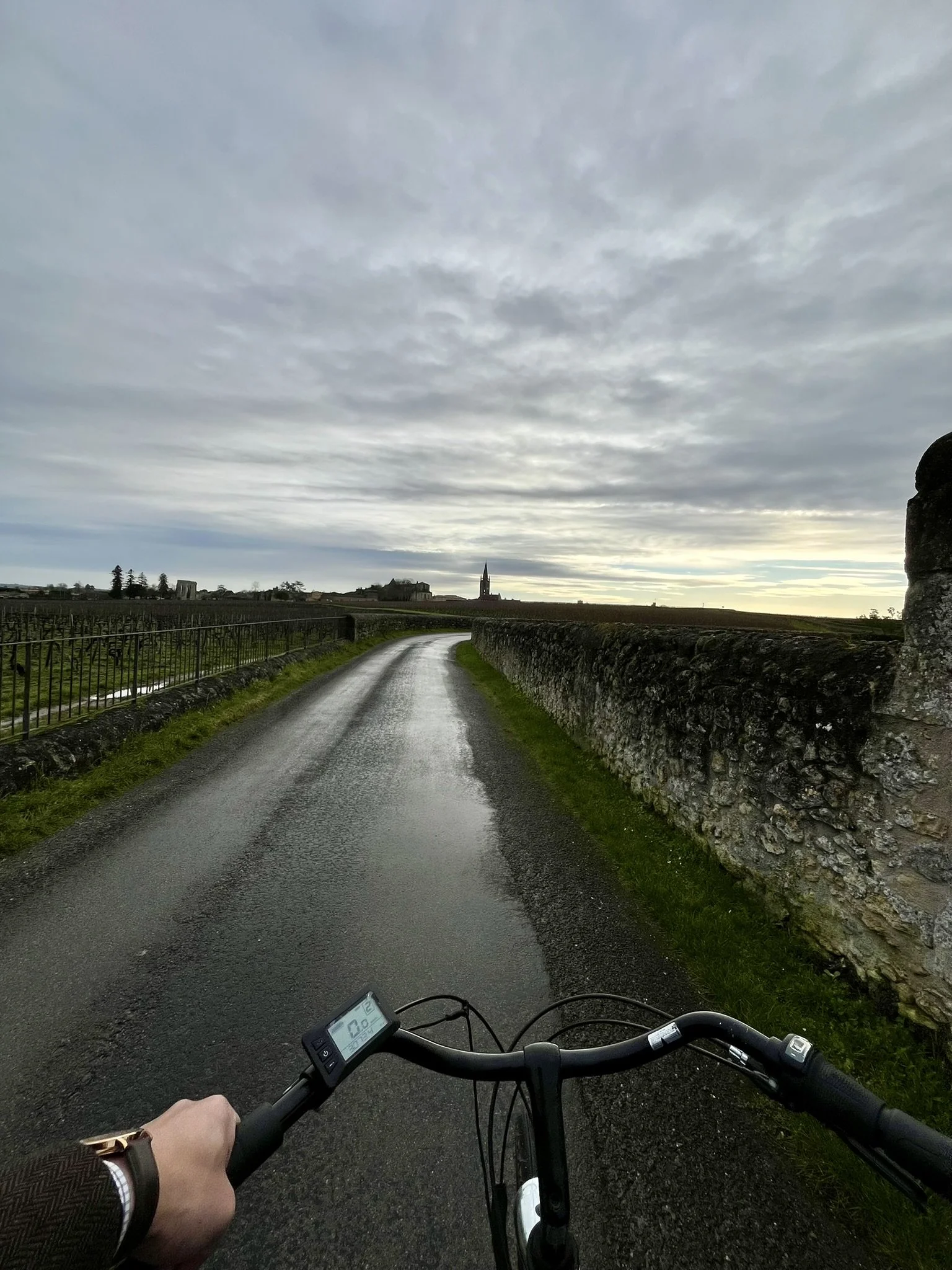2e Pensée: A First Journey to Bordeaux: The Art of Traveling Solo
Place de la Bourse, Bordeaux, 21 January 2025
There are moments in life when we step into the unknown not merely for adventure’s sake, but to encounter the very essence of our souls. My first solo journey to Bordeaux in February 2024 was such a moment—a pilgrimage of spirit where time, history, and literature converged in quiet harmony.
The First Steps into a Timeless City
Stepping into Bordeaux felt strangely like coming home to a place I had never been. The city welcomed me not with fanfare but with the gentle assurance of its quiet grandeur—cobblestone streets whispering stories of centuries past, golden facades catching the winter light like old parchment warmed by a candle’s glow. Here, time did not rush; it meandered, like the River Garonne itself, unhurried, reflective, carrying with it the weight of history and the ease of the present moment - the river’s meandering flow seen over the Pont de Pierre bridge seemed to invite me to do the same.
I wandered without a fixed destination, letting my feet trace the rhythm of the city. Each square, each narrow street seemed to invite a different mood—Place de la Bourse at dusk, its lights flickering over the dried, yet still reflective Miroir d’Eau, felt like a dream suspended between past and present. On one evening, a violinist stood in quiet elegance, drawing from the night the kind of music that lingers not just in the air but in the soul. Some danced, others paused, and I—an observer yet fully immersed—felt an almost ineffable sense of belonging.
As I walked, I thought of Shakespeare’s words from The Tempest:
“The great globe itself, yea, all which it inherit, shall dissolve, and, like this insubstantial pageant faded, leave not a rack behind.”
In that moment, I understood Shakespeare's meditation on the transience of life. Bordeaux, like the world, and like ourselves, is both fleeting and eternal—a reflection of time’s quiet passage. As I strolled past the Monument des Girondins—a striking reminder of the city's revolutionary heritage—I couldn’t help but recall again a line from Shakespeare’s Henry V:
“We few, we happy few, we band of brothers…”
Here, even monuments seem to speak, echoing the enduring spirit of those who dared to shape history. The Monument des Girondins, proud and resolute, stood as a testament to the city’s resilience and the timeless struggle between power and liberty—a scene that might well have been penned by the Bard himself.
The Art of a Table for One
There is a refined joy in savoring life alone at a bistro, a quiet communion with existence. In Bordeaux, solitude was not loneliness but an invitation to absorb beauty in every detail. A couple near the window shares a bottle of wine, their conversation a slow, intimate dance between sips. A few tables away, a man in a well-worn jacket reads Le Monde, his fingers absently tracing the rim of his glass as waiters move with practiced ease. I remember ordering a glass of Pomerol—deep, structured, and patient, much like the city itself. Its lush aromas fluttered with the scent of butter and warm bread drifting past as the sun catches the rim of the glass before me. Alone, yet part of it all. No rush, just presence.
It was at a café nearby that I first encountered the canelé. With its caramelized exterior and soft, tender heart scented with vanilla and a hint of rum, it was a delight as intricate as any sonnet. Much like Shakespeare’s musings on the fleeting nature of beauty in Sonnet 18—“But thy eternal summer shall not fade…”—this little pastry seemed to tell the story of the city. Born in the shadow of the city’s historic trade route, it carries whispers of the past: convent kitchens, flour-dusted hands, and the unspoken rhythm of craftsmanship. It is a humble testament to time’s slow magic, each bite a taste of tradition, caramelized and golden leaving an impression that was both delicate and enduring.
A Pilgrimage of Taste and Time
Of course, no journey to Bordeaux would be complete without seeking the heart of its greatest tradition, passion, and gift to the world—wine. With many chateaux scheduled to discover, my very first - a visit to Château Pape-Clément was not just about tasting, but about listening to the stories held within each bottle. I stood in awe of the history that reverberated through the estate’s grounds, its vines reaching deep into the soil as if they too were yearning to pass down their wisdom. When I tasted the wines, it wasn’t merely the elegance I admired, but the patience, the slow unfolding of time into something extraordinary. I saw in these bottles a reflection of my own journey—still evolving, gaining depth, shaped by experience and the passage of time. Each taste was a testament to patience and the art of transformation, reminiscent once more of the Bard’s own reflections on the relentless march of time in The Winter’s Tale:
“Time, thou must untangle this, not I; It is too hard a knot for me to untie.”
In Sauternes, at Château La Tour Blanche later in the week, a shared moment over a 2010 vintage bridged the gap between past and present. The conversation with my host, the château’s sommelier, filled with mutual reverence for the craft of winemaking, felt like a timeless exchange where words and wine flowed with equal grace.
Returning, and Finding More
One does not truly leave a place that has shaped them. A year later, in January 2025, I found myself once more in Bordeaux—no longer a first-time traveler, but a returning guest. This time, I carried with me not the uncertainty of a new explorer, but the quiet anticipation of deepening a beautiful relationship already begun.
This second journey unfolded differently. I wandered with greater ease, familiar yet still eager to be surprised. I returned to favorite places, but also sought out new corners of the city. The Museum of Fine Arts became a place of reflection, its paintings speaking in hushed tones of time’s quiet persistence. I felt the difference within myself, too—where my first visit had been a discovery of independence, this one was an affirmation of it. I wandered through the city with a newfound rhythm.
And then, as if by serendipity, among the stalls in the open air market, I stumbled upon an antique edition of Montaigne’s Essais from a local bookseller. The worn leather of the book, its yellowed pages thick with time, its corners and edges softened by previous hands, felt like an invitation—an echo of the wisdom Montaigne had written centuries ago about solitude and self-reflection. In that moment, I felt a quiet sense of fate, as if Bordeaux and Montaigne had conspired to be part of my journey, deepening it in ways I had not anticipated. Here was a treasure that encapsulated the endless quest for self-knowledge—a reminder that every journey, like every book, is a chance to learn and grow.
But perhaps the greatest gift of this second journey was my week in Saint-Émilion. If Bordeaux is a city that carries the weight of history with quiet nobility, Saint-Émilion is a village that seems to exist outside of time itself. I arrived not just to visit, but to linger—to let the rhythm of the vineyards and the winding medieval streets dictate my days.
One afternoon, I rented a bicycle from Les Cordeliers and rode through the vineyards early the next morning, with Edith Piaf in my earphones, her voice weaving itself into the misty air. The rows of vines stretched endlessly, bare in their winter stillness, yet full of quiet promise, like a great work of art before the first brushstroke. As I pedaled along the narrow country roads along the low stone walls, Non, je ne regrette rien played, and for a fleeting moment, it felt like a perfect truth: “no, I regret nothing." The crisp morning air, the golden limestone of the village in the distance as the sun steadily rose, the iconic pulsating rhythm of her song aligned with my beating heart and the cadence of my feet pedaling as if swimming down the road and through the vineyards—everything had aligned in a beautiful harmony in my own moment of la vie en rose. I felt as though I had become part of the landscape itself—a fleeting cinematic moment suspended in time. I was living a memory in the making - I knew then: this was an experience I will look back to throughout my life.
The Return Home: Never Quite the Same
To travel alone is to engage in a quiet transformation. The journey does not end when the plane lands or the suitcase is unpacked. Bordeaux and Saint-Émilion remained with me, not just as places I had visited, but as something woven into the fabric of who I was becoming.
I returned home with a new awareness—that elegance is not about grand gestures, but about presence; that solitude, when embraced, refines the soul; that to truly savor life, one must first learn how to savor it starting with the cherished company of one’s self.
And perhaps, like a fine Bordeaux wine, I too had begun the slow and patient process of maturing into something richer, something more deeply understood.
À la prochaine, Bordeaux et Saint-Émilion.
As Shakespeare reminds us, “We are such stuff as dreams are made on.”


